Organisational Behaviour Report: Asda Ltd - Culture, Motivation, Teams
VerifiedAdded on 2023/01/05
|13
|3872
|37
Report
AI Summary
This report provides a comprehensive analysis of organisational behaviour within Asda Ltd, a British supermarket retailer. It explores how organisational culture, power, and politics influence individual and group performance, referencing Handy's model and various types of organisational politics. The report delves into content and process theories of motivation, including Maslow's Hierarchy of Needs and Vroom's Expectancy Theory, and discusses motivational techniques like profit sharing and job security. Furthermore, it defines different types of teams and outlines strategies for creating effective teams in contrast to ineffective ones. Finally, the report examines organisational behaviour theories and philosophies in the context of Asda Ltd, offering insights into how the company can optimize its operations and achieve its business objectives.
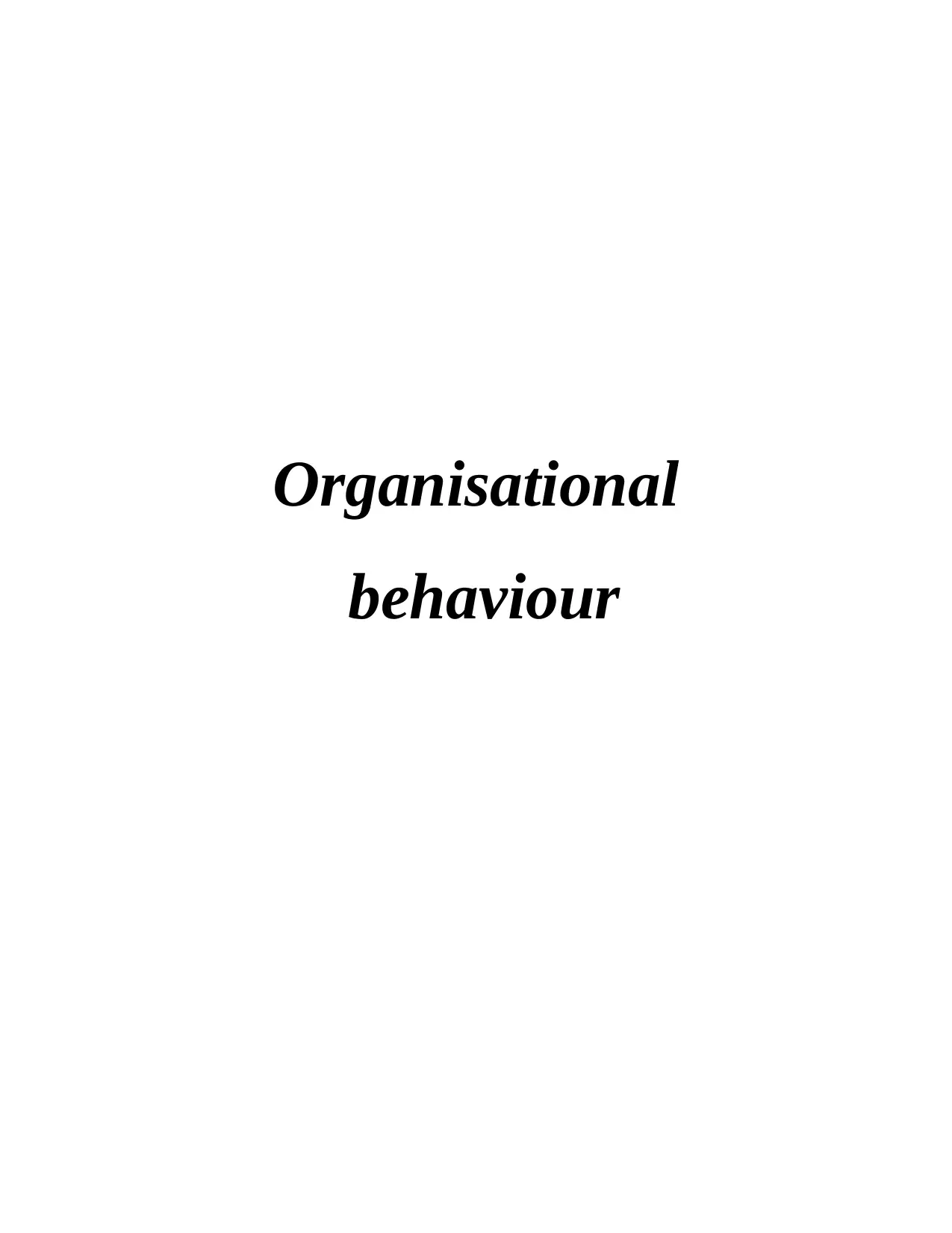
Organisational
behaviour
behaviour
Paraphrase This Document
Need a fresh take? Get an instant paraphrase of this document with our AI Paraphraser
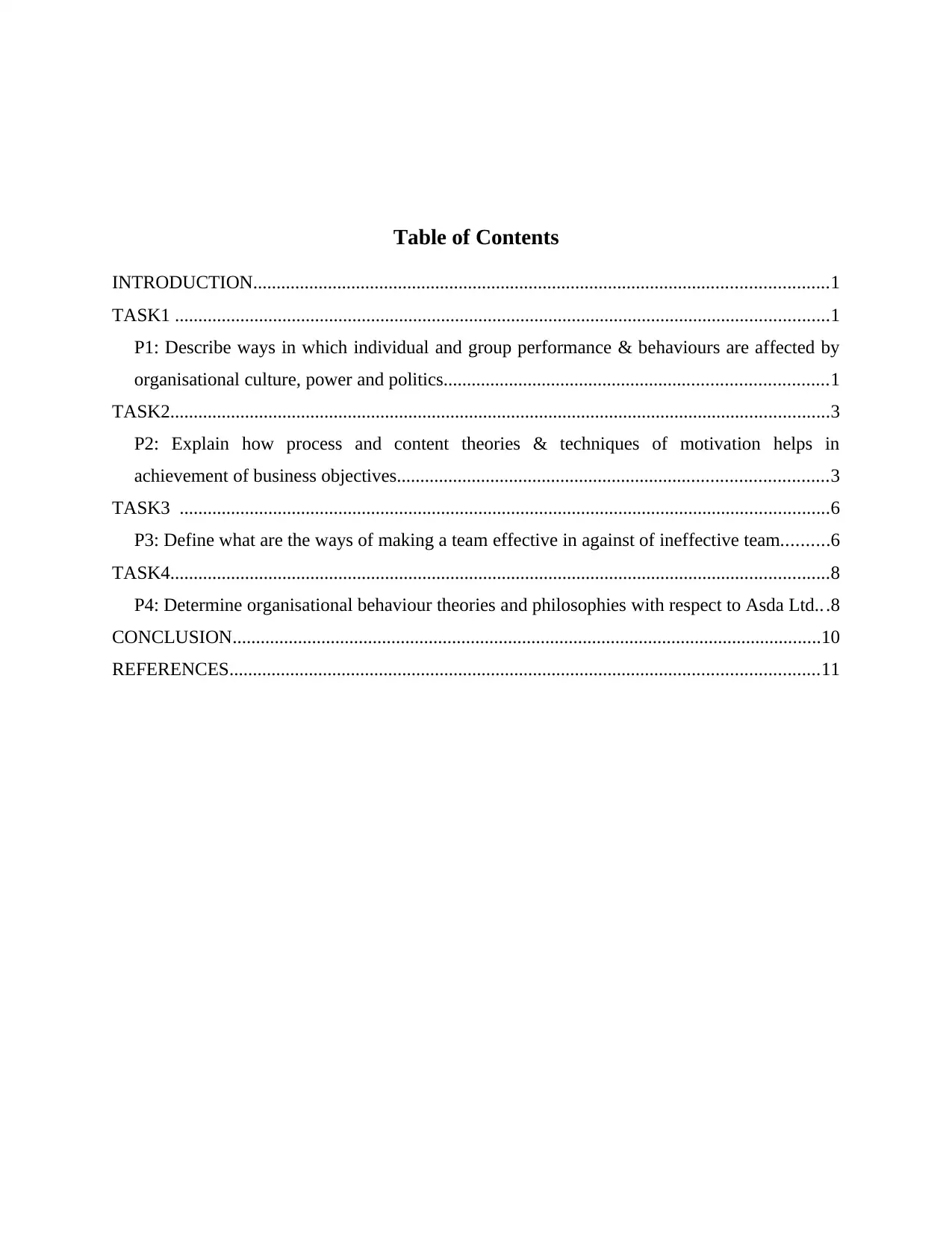
Table of Contents
INTRODUCTION...........................................................................................................................1
TASK1 ............................................................................................................................................1
P1: Describe ways in which individual and group performance & behaviours are affected by
organisational culture, power and politics..................................................................................1
TASK2.............................................................................................................................................3
P2: Explain how process and content theories & techniques of motivation helps in
achievement of business objectives............................................................................................3
TASK3 ...........................................................................................................................................6
P3: Define what are the ways of making a team effective in against of ineffective team..........6
TASK4.............................................................................................................................................8
P4: Determine organisational behaviour theories and philosophies with respect to Asda Ltd.. .8
CONCLUSION..............................................................................................................................10
REFERENCES..............................................................................................................................11
INTRODUCTION...........................................................................................................................1
TASK1 ............................................................................................................................................1
P1: Describe ways in which individual and group performance & behaviours are affected by
organisational culture, power and politics..................................................................................1
TASK2.............................................................................................................................................3
P2: Explain how process and content theories & techniques of motivation helps in
achievement of business objectives............................................................................................3
TASK3 ...........................................................................................................................................6
P3: Define what are the ways of making a team effective in against of ineffective team..........6
TASK4.............................................................................................................................................8
P4: Determine organisational behaviour theories and philosophies with respect to Asda Ltd.. .8
CONCLUSION..............................................................................................................................10
REFERENCES..............................................................................................................................11
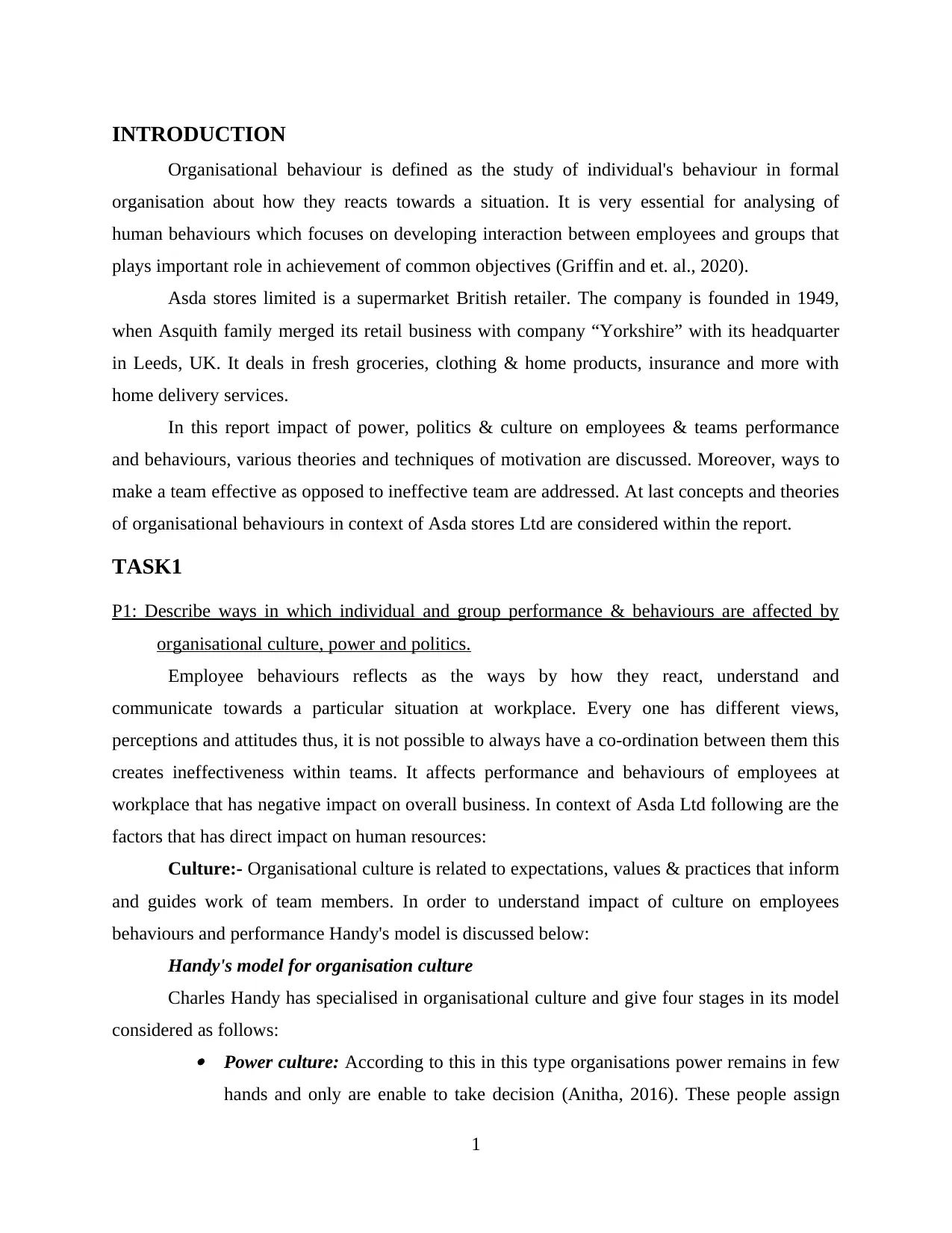
INTRODUCTION
Organisational behaviour is defined as the study of individual's behaviour in formal
organisation about how they reacts towards a situation. It is very essential for analysing of
human behaviours which focuses on developing interaction between employees and groups that
plays important role in achievement of common objectives (Griffin and et. al., 2020).
Asda stores limited is a supermarket British retailer. The company is founded in 1949,
when Asquith family merged its retail business with company “Yorkshire” with its headquarter
in Leeds, UK. It deals in fresh groceries, clothing & home products, insurance and more with
home delivery services.
In this report impact of power, politics & culture on employees & teams performance
and behaviours, various theories and techniques of motivation are discussed. Moreover, ways to
make a team effective as opposed to ineffective team are addressed. At last concepts and theories
of organisational behaviours in context of Asda stores Ltd are considered within the report.
TASK1
P1: Describe ways in which individual and group performance & behaviours are affected by
organisational culture, power and politics.
Employee behaviours reflects as the ways by how they react, understand and
communicate towards a particular situation at workplace. Every one has different views,
perceptions and attitudes thus, it is not possible to always have a co-ordination between them this
creates ineffectiveness within teams. It affects performance and behaviours of employees at
workplace that has negative impact on overall business. In context of Asda Ltd following are the
factors that has direct impact on human resources:
Culture:- Organisational culture is related to expectations, values & practices that inform
and guides work of team members. In order to understand impact of culture on employees
behaviours and performance Handy's model is discussed below:
Handy's model for organisation culture
Charles Handy has specialised in organisational culture and give four stages in its model
considered as follows:
Power culture: According to this in this type organisations power remains in few
hands and only are enable to take decision (Anitha, 2016). These people assign
1
Organisational behaviour is defined as the study of individual's behaviour in formal
organisation about how they reacts towards a situation. It is very essential for analysing of
human behaviours which focuses on developing interaction between employees and groups that
plays important role in achievement of common objectives (Griffin and et. al., 2020).
Asda stores limited is a supermarket British retailer. The company is founded in 1949,
when Asquith family merged its retail business with company “Yorkshire” with its headquarter
in Leeds, UK. It deals in fresh groceries, clothing & home products, insurance and more with
home delivery services.
In this report impact of power, politics & culture on employees & teams performance
and behaviours, various theories and techniques of motivation are discussed. Moreover, ways to
make a team effective as opposed to ineffective team are addressed. At last concepts and theories
of organisational behaviours in context of Asda stores Ltd are considered within the report.
TASK1
P1: Describe ways in which individual and group performance & behaviours are affected by
organisational culture, power and politics.
Employee behaviours reflects as the ways by how they react, understand and
communicate towards a particular situation at workplace. Every one has different views,
perceptions and attitudes thus, it is not possible to always have a co-ordination between them this
creates ineffectiveness within teams. It affects performance and behaviours of employees at
workplace that has negative impact on overall business. In context of Asda Ltd following are the
factors that has direct impact on human resources:
Culture:- Organisational culture is related to expectations, values & practices that inform
and guides work of team members. In order to understand impact of culture on employees
behaviours and performance Handy's model is discussed below:
Handy's model for organisation culture
Charles Handy has specialised in organisational culture and give four stages in its model
considered as follows:
Power culture: According to this in this type organisations power remains in few
hands and only are enable to take decision (Anitha, 2016). These people assign
1
⊘ This is a preview!⊘
Do you want full access?
Subscribe today to unlock all pages.

Trusted by 1+ million students worldwide
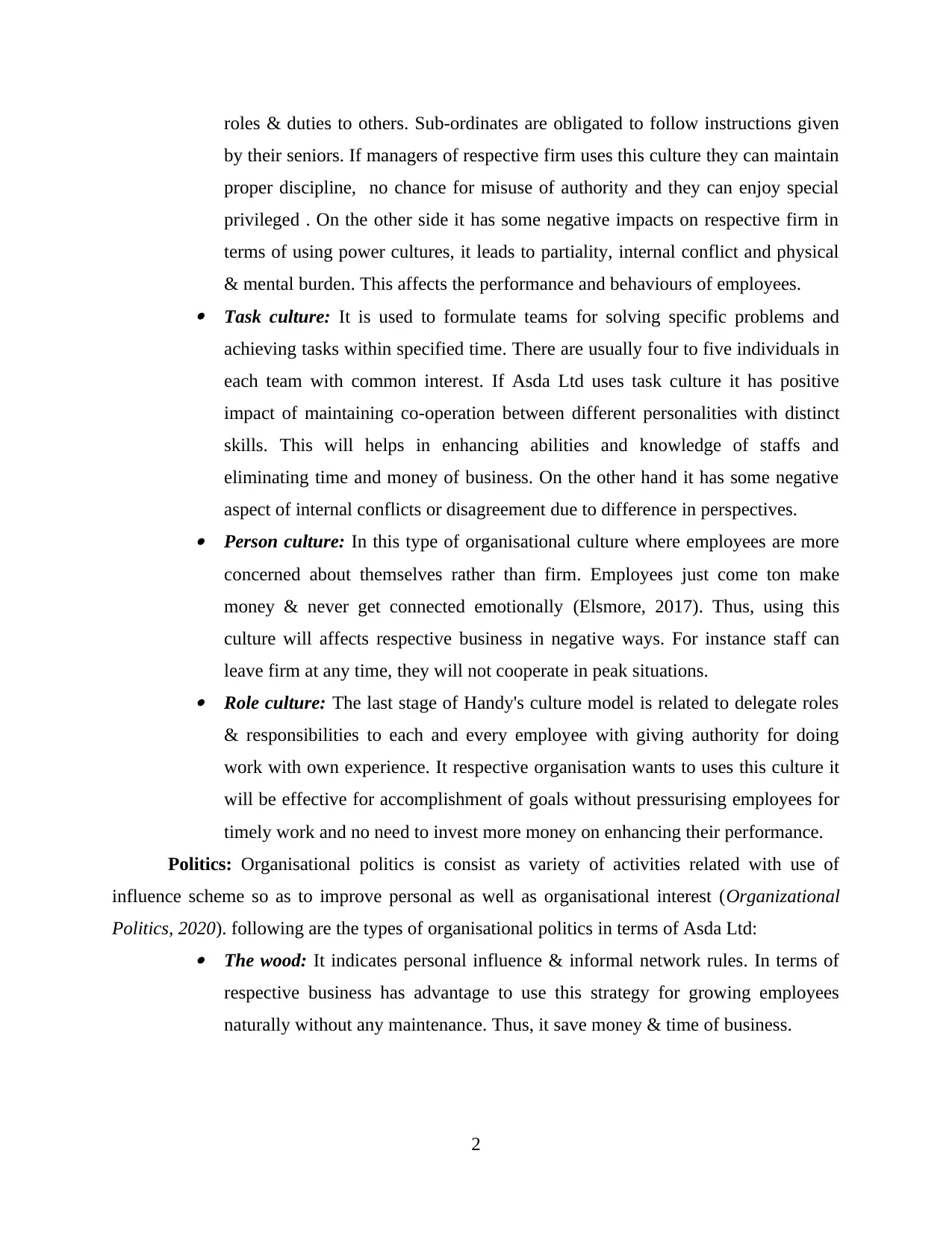
roles & duties to others. Sub-ordinates are obligated to follow instructions given
by their seniors. If managers of respective firm uses this culture they can maintain
proper discipline, no chance for misuse of authority and they can enjoy special
privileged . On the other side it has some negative impacts on respective firm in
terms of using power cultures, it leads to partiality, internal conflict and physical
& mental burden. This affects the performance and behaviours of employees.
Task culture: It is used to formulate teams for solving specific problems and
achieving tasks within specified time. There are usually four to five individuals in
each team with common interest. If Asda Ltd uses task culture it has positive
impact of maintaining co-operation between different personalities with distinct
skills. This will helps in enhancing abilities and knowledge of staffs and
eliminating time and money of business. On the other hand it has some negative
aspect of internal conflicts or disagreement due to difference in perspectives.
Person culture: In this type of organisational culture where employees are more
concerned about themselves rather than firm. Employees just come ton make
money & never get connected emotionally (Elsmore, 2017). Thus, using this
culture will affects respective business in negative ways. For instance staff can
leave firm at any time, they will not cooperate in peak situations.
Role culture: The last stage of Handy's culture model is related to delegate roles
& responsibilities to each and every employee with giving authority for doing
work with own experience. It respective organisation wants to uses this culture it
will be effective for accomplishment of goals without pressurising employees for
timely work and no need to invest more money on enhancing their performance.
Politics: Organisational politics is consist as variety of activities related with use of
influence scheme so as to improve personal as well as organisational interest (Organizational
Politics, 2020). following are the types of organisational politics in terms of Asda Ltd:
The wood: It indicates personal influence & informal network rules. In terms of
respective business has advantage to use this strategy for growing employees
naturally without any maintenance. Thus, it save money & time of business.
2
by their seniors. If managers of respective firm uses this culture they can maintain
proper discipline, no chance for misuse of authority and they can enjoy special
privileged . On the other side it has some negative impacts on respective firm in
terms of using power cultures, it leads to partiality, internal conflict and physical
& mental burden. This affects the performance and behaviours of employees.
Task culture: It is used to formulate teams for solving specific problems and
achieving tasks within specified time. There are usually four to five individuals in
each team with common interest. If Asda Ltd uses task culture it has positive
impact of maintaining co-operation between different personalities with distinct
skills. This will helps in enhancing abilities and knowledge of staffs and
eliminating time and money of business. On the other hand it has some negative
aspect of internal conflicts or disagreement due to difference in perspectives.
Person culture: In this type of organisational culture where employees are more
concerned about themselves rather than firm. Employees just come ton make
money & never get connected emotionally (Elsmore, 2017). Thus, using this
culture will affects respective business in negative ways. For instance staff can
leave firm at any time, they will not cooperate in peak situations.
Role culture: The last stage of Handy's culture model is related to delegate roles
& responsibilities to each and every employee with giving authority for doing
work with own experience. It respective organisation wants to uses this culture it
will be effective for accomplishment of goals without pressurising employees for
timely work and no need to invest more money on enhancing their performance.
Politics: Organisational politics is consist as variety of activities related with use of
influence scheme so as to improve personal as well as organisational interest (Organizational
Politics, 2020). following are the types of organisational politics in terms of Asda Ltd:
The wood: It indicates personal influence & informal network rules. In terms of
respective business has advantage to use this strategy for growing employees
naturally without any maintenance. Thus, it save money & time of business.
2
Paraphrase This Document
Need a fresh take? Get an instant paraphrase of this document with our AI Paraphraser
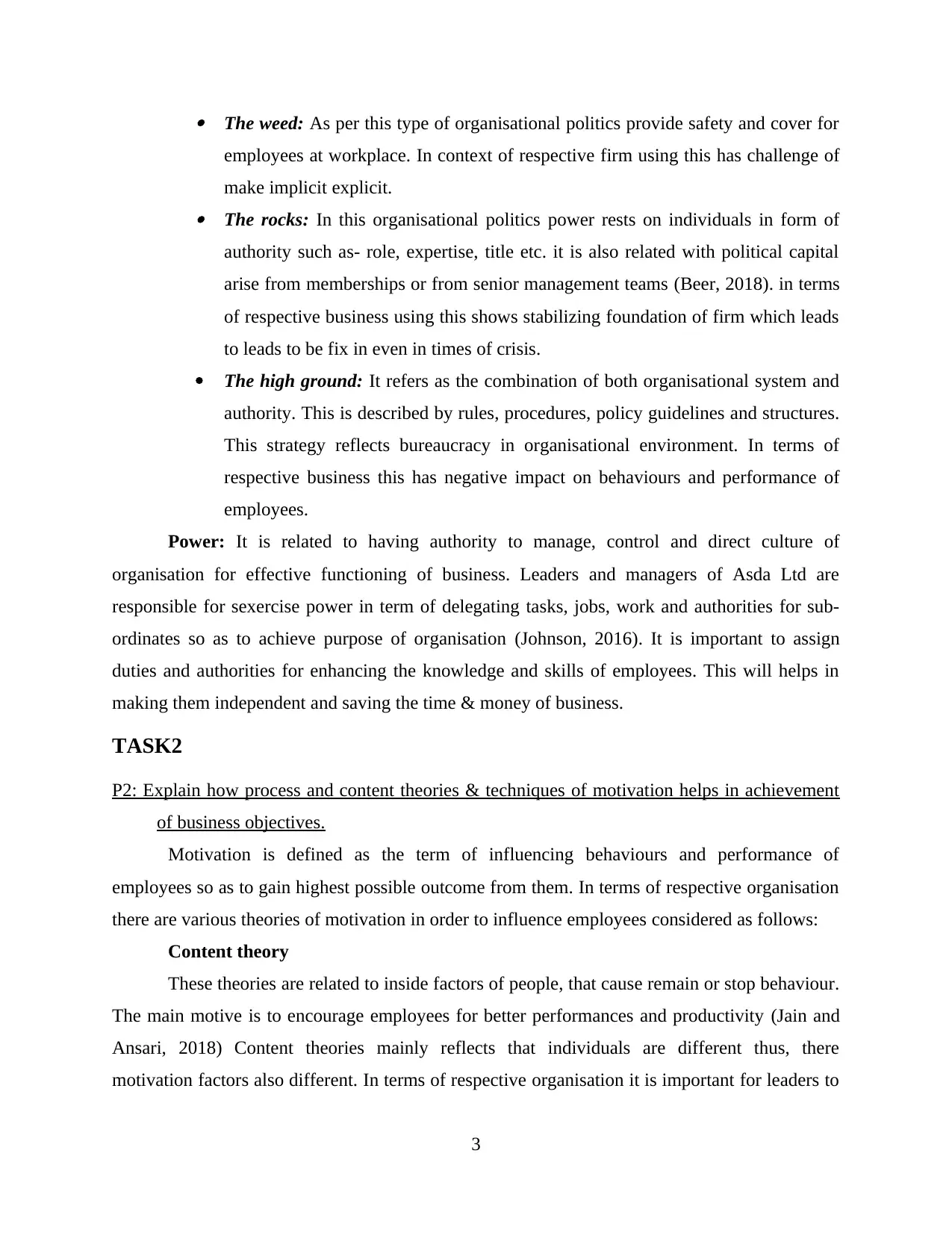
The weed: As per this type of organisational politics provide safety and cover for
employees at workplace. In context of respective firm using this has challenge of
make implicit explicit.
The rocks: In this organisational politics power rests on individuals in form of
authority such as- role, expertise, title etc. it is also related with political capital
arise from memberships or from senior management teams (Beer, 2018). in terms
of respective business using this shows stabilizing foundation of firm which leads
to leads to be fix in even in times of crisis.
The high ground: It refers as the combination of both organisational system and
authority. This is described by rules, procedures, policy guidelines and structures.
This strategy reflects bureaucracy in organisational environment. In terms of
respective business this has negative impact on behaviours and performance of
employees.
Power: It is related to having authority to manage, control and direct culture of
organisation for effective functioning of business. Leaders and managers of Asda Ltd are
responsible for sexercise power in term of delegating tasks, jobs, work and authorities for sub-
ordinates so as to achieve purpose of organisation (Johnson, 2016). It is important to assign
duties and authorities for enhancing the knowledge and skills of employees. This will helps in
making them independent and saving the time & money of business.
TASK2
P2: Explain how process and content theories & techniques of motivation helps in achievement
of business objectives.
Motivation is defined as the term of influencing behaviours and performance of
employees so as to gain highest possible outcome from them. In terms of respective organisation
there are various theories of motivation in order to influence employees considered as follows:
Content theory
These theories are related to inside factors of people, that cause remain or stop behaviour.
The main motive is to encourage employees for better performances and productivity (Jain and
Ansari, 2018) Content theories mainly reflects that individuals are different thus, there
motivation factors also different. In terms of respective organisation it is important for leaders to
3
employees at workplace. In context of respective firm using this has challenge of
make implicit explicit.
The rocks: In this organisational politics power rests on individuals in form of
authority such as- role, expertise, title etc. it is also related with political capital
arise from memberships or from senior management teams (Beer, 2018). in terms
of respective business using this shows stabilizing foundation of firm which leads
to leads to be fix in even in times of crisis.
The high ground: It refers as the combination of both organisational system and
authority. This is described by rules, procedures, policy guidelines and structures.
This strategy reflects bureaucracy in organisational environment. In terms of
respective business this has negative impact on behaviours and performance of
employees.
Power: It is related to having authority to manage, control and direct culture of
organisation for effective functioning of business. Leaders and managers of Asda Ltd are
responsible for sexercise power in term of delegating tasks, jobs, work and authorities for sub-
ordinates so as to achieve purpose of organisation (Johnson, 2016). It is important to assign
duties and authorities for enhancing the knowledge and skills of employees. This will helps in
making them independent and saving the time & money of business.
TASK2
P2: Explain how process and content theories & techniques of motivation helps in achievement
of business objectives.
Motivation is defined as the term of influencing behaviours and performance of
employees so as to gain highest possible outcome from them. In terms of respective organisation
there are various theories of motivation in order to influence employees considered as follows:
Content theory
These theories are related to inside factors of people, that cause remain or stop behaviour.
The main motive is to encourage employees for better performances and productivity (Jain and
Ansari, 2018) Content theories mainly reflects that individuals are different thus, there
motivation factors also different. In terms of respective organisation it is important for leaders to
3
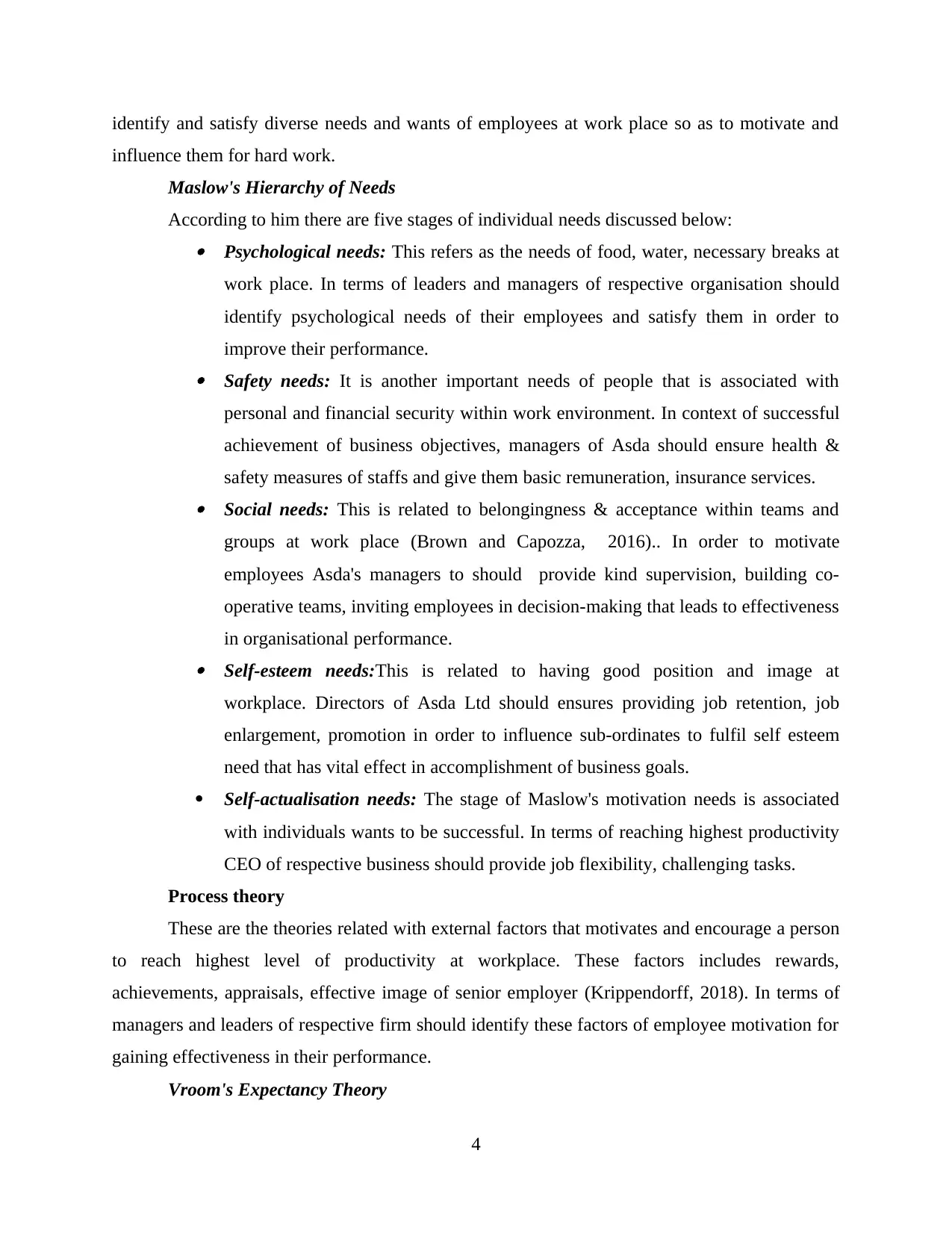
identify and satisfy diverse needs and wants of employees at work place so as to motivate and
influence them for hard work.
Maslow's Hierarchy of Needs
According to him there are five stages of individual needs discussed below:
Psychological needs: This refers as the needs of food, water, necessary breaks at
work place. In terms of leaders and managers of respective organisation should
identify psychological needs of their employees and satisfy them in order to
improve their performance.
Safety needs: It is another important needs of people that is associated with
personal and financial security within work environment. In context of successful
achievement of business objectives, managers of Asda should ensure health &
safety measures of staffs and give them basic remuneration, insurance services.
Social needs: This is related to belongingness & acceptance within teams and
groups at work place (Brown and Capozza, 2016).. In order to motivate
employees Asda's managers to should provide kind supervision, building co-
operative teams, inviting employees in decision-making that leads to effectiveness
in organisational performance.
Self-esteem needs:This is related to having good position and image at
workplace. Directors of Asda Ltd should ensures providing job retention, job
enlargement, promotion in order to influence sub-ordinates to fulfil self esteem
need that has vital effect in accomplishment of business goals.
Self-actualisation needs: The stage of Maslow's motivation needs is associated
with individuals wants to be successful. In terms of reaching highest productivity
CEO of respective business should provide job flexibility, challenging tasks.
Process theory
These are the theories related with external factors that motivates and encourage a person
to reach highest level of productivity at workplace. These factors includes rewards,
achievements, appraisals, effective image of senior employer (Krippendorff, 2018). In terms of
managers and leaders of respective firm should identify these factors of employee motivation for
gaining effectiveness in their performance.
Vroom's Expectancy Theory
4
influence them for hard work.
Maslow's Hierarchy of Needs
According to him there are five stages of individual needs discussed below:
Psychological needs: This refers as the needs of food, water, necessary breaks at
work place. In terms of leaders and managers of respective organisation should
identify psychological needs of their employees and satisfy them in order to
improve their performance.
Safety needs: It is another important needs of people that is associated with
personal and financial security within work environment. In context of successful
achievement of business objectives, managers of Asda should ensure health &
safety measures of staffs and give them basic remuneration, insurance services.
Social needs: This is related to belongingness & acceptance within teams and
groups at work place (Brown and Capozza, 2016).. In order to motivate
employees Asda's managers to should provide kind supervision, building co-
operative teams, inviting employees in decision-making that leads to effectiveness
in organisational performance.
Self-esteem needs:This is related to having good position and image at
workplace. Directors of Asda Ltd should ensures providing job retention, job
enlargement, promotion in order to influence sub-ordinates to fulfil self esteem
need that has vital effect in accomplishment of business goals.
Self-actualisation needs: The stage of Maslow's motivation needs is associated
with individuals wants to be successful. In terms of reaching highest productivity
CEO of respective business should provide job flexibility, challenging tasks.
Process theory
These are the theories related with external factors that motivates and encourage a person
to reach highest level of productivity at workplace. These factors includes rewards,
achievements, appraisals, effective image of senior employer (Krippendorff, 2018). In terms of
managers and leaders of respective firm should identify these factors of employee motivation for
gaining effectiveness in their performance.
Vroom's Expectancy Theory
4
⊘ This is a preview!⊘
Do you want full access?
Subscribe today to unlock all pages.

Trusted by 1+ million students worldwide
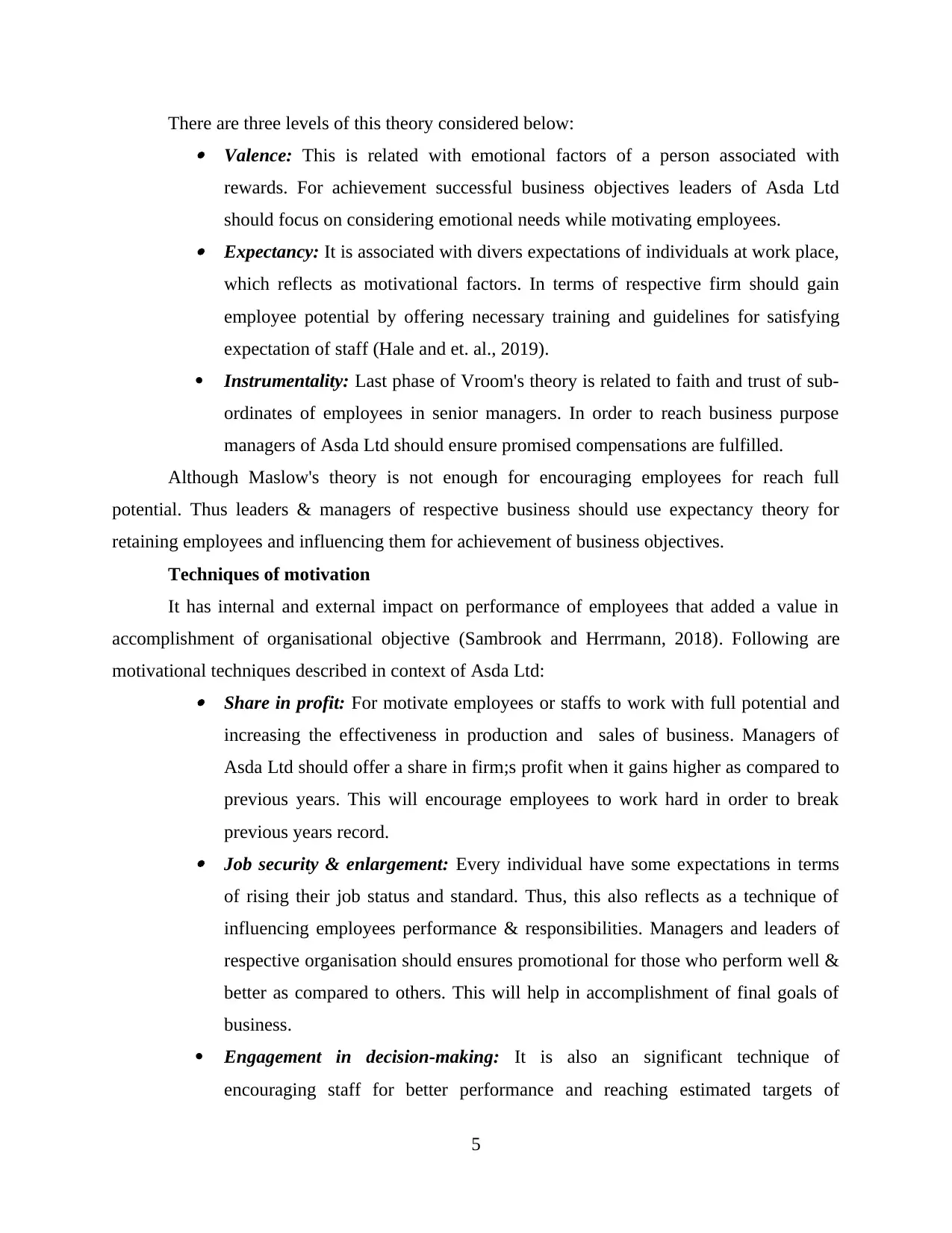
There are three levels of this theory considered below:
Valence: This is related with emotional factors of a person associated with
rewards. For achievement successful business objectives leaders of Asda Ltd
should focus on considering emotional needs while motivating employees.
Expectancy: It is associated with divers expectations of individuals at work place,
which reflects as motivational factors. In terms of respective firm should gain
employee potential by offering necessary training and guidelines for satisfying
expectation of staff (Hale and et. al., 2019).
Instrumentality: Last phase of Vroom's theory is related to faith and trust of sub-
ordinates of employees in senior managers. In order to reach business purpose
managers of Asda Ltd should ensure promised compensations are fulfilled.
Although Maslow's theory is not enough for encouraging employees for reach full
potential. Thus leaders & managers of respective business should use expectancy theory for
retaining employees and influencing them for achievement of business objectives.
Techniques of motivation
It has internal and external impact on performance of employees that added a value in
accomplishment of organisational objective (Sambrook and Herrmann, 2018). Following are
motivational techniques described in context of Asda Ltd:
Share in profit: For motivate employees or staffs to work with full potential and
increasing the effectiveness in production and sales of business. Managers of
Asda Ltd should offer a share in firm;s profit when it gains higher as compared to
previous years. This will encourage employees to work hard in order to break
previous years record.
Job security & enlargement: Every individual have some expectations in terms
of rising their job status and standard. Thus, this also reflects as a technique of
influencing employees performance & responsibilities. Managers and leaders of
respective organisation should ensures promotional for those who perform well &
better as compared to others. This will help in accomplishment of final goals of
business.
Engagement in decision-making: It is also an significant technique of
encouraging staff for better performance and reaching estimated targets of
5
Valence: This is related with emotional factors of a person associated with
rewards. For achievement successful business objectives leaders of Asda Ltd
should focus on considering emotional needs while motivating employees.
Expectancy: It is associated with divers expectations of individuals at work place,
which reflects as motivational factors. In terms of respective firm should gain
employee potential by offering necessary training and guidelines for satisfying
expectation of staff (Hale and et. al., 2019).
Instrumentality: Last phase of Vroom's theory is related to faith and trust of sub-
ordinates of employees in senior managers. In order to reach business purpose
managers of Asda Ltd should ensure promised compensations are fulfilled.
Although Maslow's theory is not enough for encouraging employees for reach full
potential. Thus leaders & managers of respective business should use expectancy theory for
retaining employees and influencing them for achievement of business objectives.
Techniques of motivation
It has internal and external impact on performance of employees that added a value in
accomplishment of organisational objective (Sambrook and Herrmann, 2018). Following are
motivational techniques described in context of Asda Ltd:
Share in profit: For motivate employees or staffs to work with full potential and
increasing the effectiveness in production and sales of business. Managers of
Asda Ltd should offer a share in firm;s profit when it gains higher as compared to
previous years. This will encourage employees to work hard in order to break
previous years record.
Job security & enlargement: Every individual have some expectations in terms
of rising their job status and standard. Thus, this also reflects as a technique of
influencing employees performance & responsibilities. Managers and leaders of
respective organisation should ensures promotional for those who perform well &
better as compared to others. This will help in accomplishment of final goals of
business.
Engagement in decision-making: It is also an significant technique of
encouraging staff for better performance and reaching estimated targets of
5
Paraphrase This Document
Need a fresh take? Get an instant paraphrase of this document with our AI Paraphraser
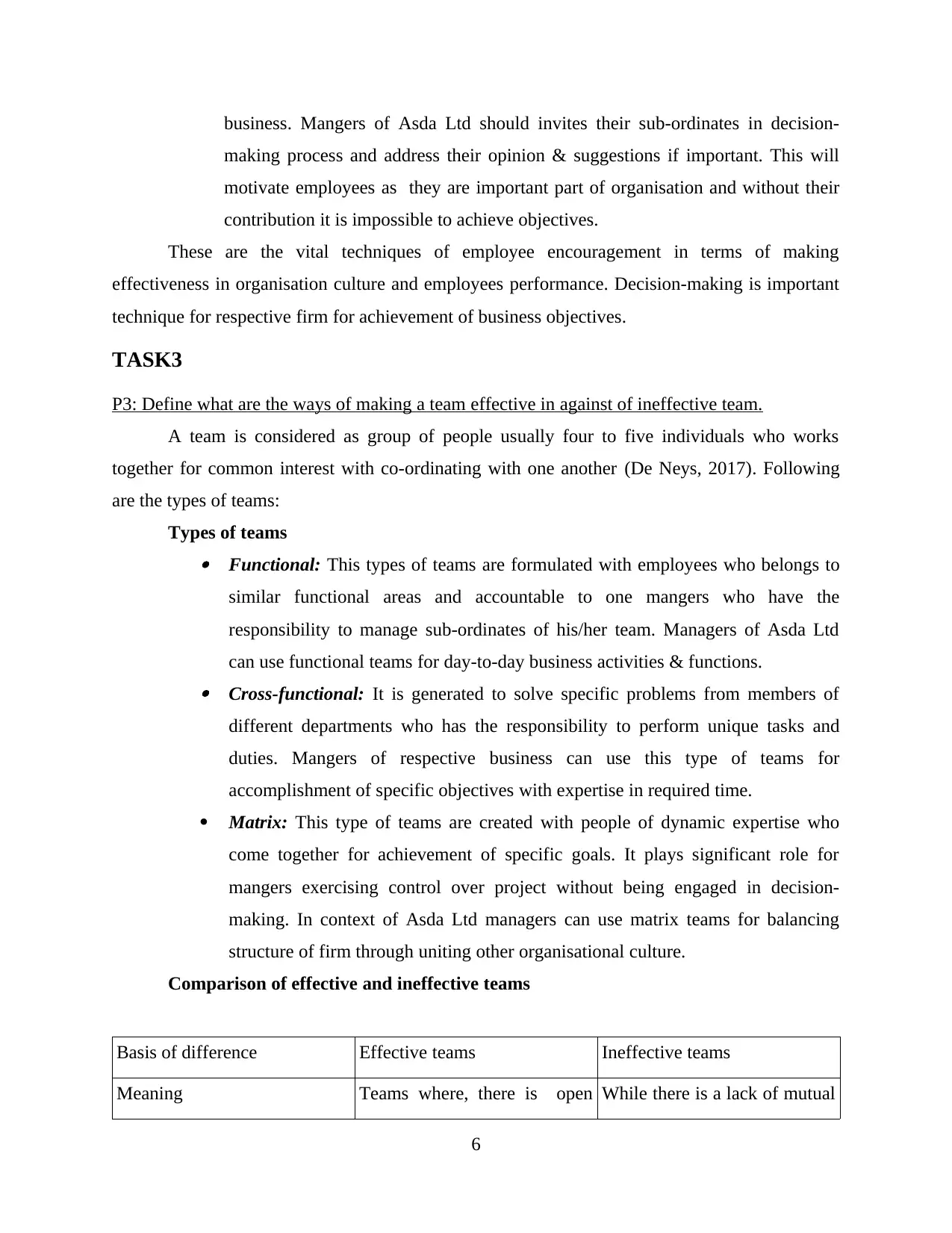
business. Mangers of Asda Ltd should invites their sub-ordinates in decision-
making process and address their opinion & suggestions if important. This will
motivate employees as they are important part of organisation and without their
contribution it is impossible to achieve objectives.
These are the vital techniques of employee encouragement in terms of making
effectiveness in organisation culture and employees performance. Decision-making is important
technique for respective firm for achievement of business objectives.
TASK3
P3: Define what are the ways of making a team effective in against of ineffective team.
A team is considered as group of people usually four to five individuals who works
together for common interest with co-ordinating with one another (De Neys, 2017). Following
are the types of teams:
Types of teams
Functional: This types of teams are formulated with employees who belongs to
similar functional areas and accountable to one mangers who have the
responsibility to manage sub-ordinates of his/her team. Managers of Asda Ltd
can use functional teams for day-to-day business activities & functions.
Cross-functional: It is generated to solve specific problems from members of
different departments who has the responsibility to perform unique tasks and
duties. Mangers of respective business can use this type of teams for
accomplishment of specific objectives with expertise in required time.
Matrix: This type of teams are created with people of dynamic expertise who
come together for achievement of specific goals. It plays significant role for
mangers exercising control over project without being engaged in decision-
making. In context of Asda Ltd managers can use matrix teams for balancing
structure of firm through uniting other organisational culture.
Comparison of effective and ineffective teams
Basis of difference Effective teams Ineffective teams
Meaning Teams where, there is open While there is a lack of mutual
6
making process and address their opinion & suggestions if important. This will
motivate employees as they are important part of organisation and without their
contribution it is impossible to achieve objectives.
These are the vital techniques of employee encouragement in terms of making
effectiveness in organisation culture and employees performance. Decision-making is important
technique for respective firm for achievement of business objectives.
TASK3
P3: Define what are the ways of making a team effective in against of ineffective team.
A team is considered as group of people usually four to five individuals who works
together for common interest with co-ordinating with one another (De Neys, 2017). Following
are the types of teams:
Types of teams
Functional: This types of teams are formulated with employees who belongs to
similar functional areas and accountable to one mangers who have the
responsibility to manage sub-ordinates of his/her team. Managers of Asda Ltd
can use functional teams for day-to-day business activities & functions.
Cross-functional: It is generated to solve specific problems from members of
different departments who has the responsibility to perform unique tasks and
duties. Mangers of respective business can use this type of teams for
accomplishment of specific objectives with expertise in required time.
Matrix: This type of teams are created with people of dynamic expertise who
come together for achievement of specific goals. It plays significant role for
mangers exercising control over project without being engaged in decision-
making. In context of Asda Ltd managers can use matrix teams for balancing
structure of firm through uniting other organisational culture.
Comparison of effective and ineffective teams
Basis of difference Effective teams Ineffective teams
Meaning Teams where, there is open While there is a lack of mutual
6
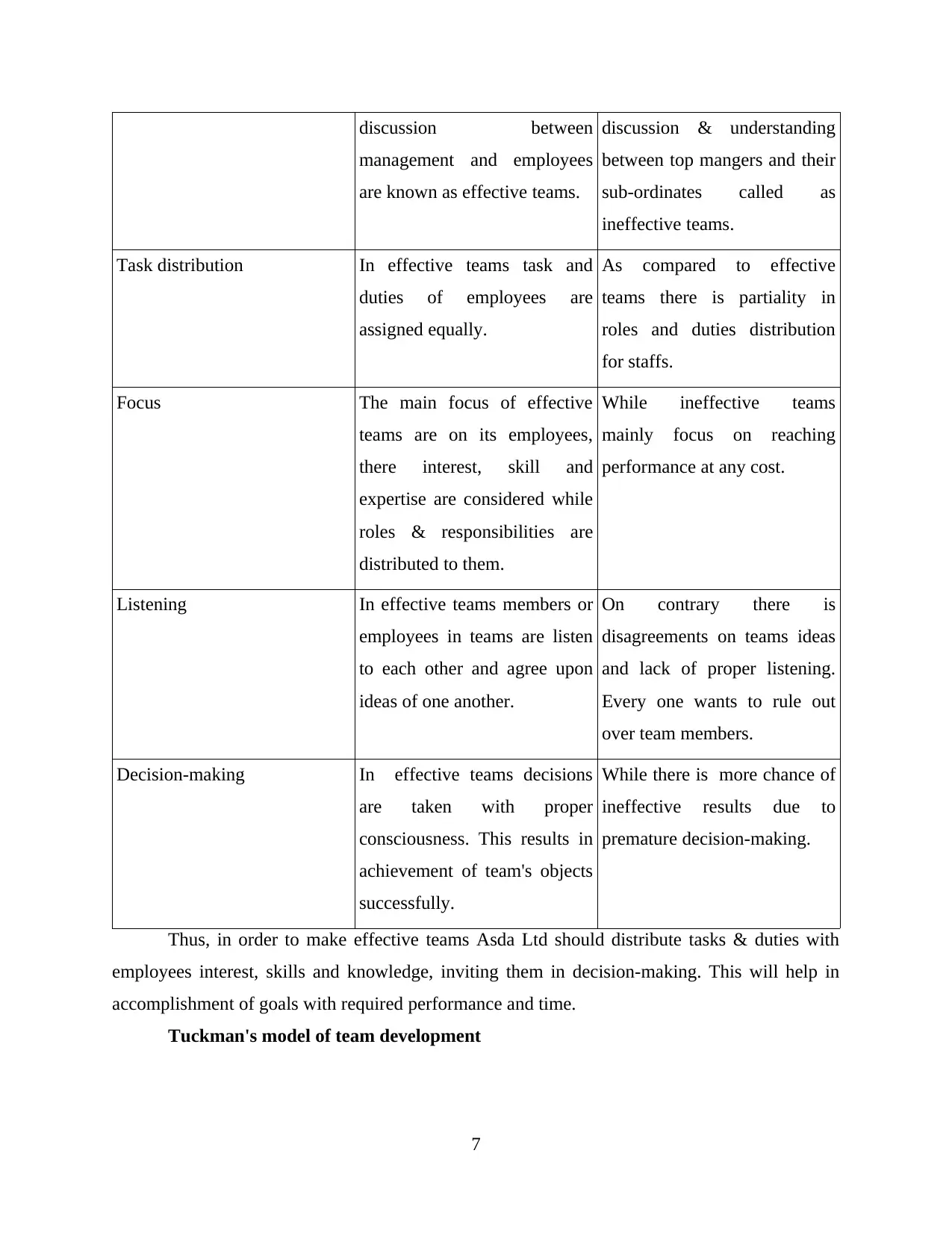
discussion between
management and employees
are known as effective teams.
discussion & understanding
between top mangers and their
sub-ordinates called as
ineffective teams.
Task distribution In effective teams task and
duties of employees are
assigned equally.
As compared to effective
teams there is partiality in
roles and duties distribution
for staffs.
Focus The main focus of effective
teams are on its employees,
there interest, skill and
expertise are considered while
roles & responsibilities are
distributed to them.
While ineffective teams
mainly focus on reaching
performance at any cost.
Listening In effective teams members or
employees in teams are listen
to each other and agree upon
ideas of one another.
On contrary there is
disagreements on teams ideas
and lack of proper listening.
Every one wants to rule out
over team members.
Decision-making In effective teams decisions
are taken with proper
consciousness. This results in
achievement of team's objects
successfully.
While there is more chance of
ineffective results due to
premature decision-making.
Thus, in order to make effective teams Asda Ltd should distribute tasks & duties with
employees interest, skills and knowledge, inviting them in decision-making. This will help in
accomplishment of goals with required performance and time.
Tuckman's model of team development
7
management and employees
are known as effective teams.
discussion & understanding
between top mangers and their
sub-ordinates called as
ineffective teams.
Task distribution In effective teams task and
duties of employees are
assigned equally.
As compared to effective
teams there is partiality in
roles and duties distribution
for staffs.
Focus The main focus of effective
teams are on its employees,
there interest, skill and
expertise are considered while
roles & responsibilities are
distributed to them.
While ineffective teams
mainly focus on reaching
performance at any cost.
Listening In effective teams members or
employees in teams are listen
to each other and agree upon
ideas of one another.
On contrary there is
disagreements on teams ideas
and lack of proper listening.
Every one wants to rule out
over team members.
Decision-making In effective teams decisions
are taken with proper
consciousness. This results in
achievement of team's objects
successfully.
While there is more chance of
ineffective results due to
premature decision-making.
Thus, in order to make effective teams Asda Ltd should distribute tasks & duties with
employees interest, skills and knowledge, inviting them in decision-making. This will help in
accomplishment of goals with required performance and time.
Tuckman's model of team development
7
⊘ This is a preview!⊘
Do you want full access?
Subscribe today to unlock all pages.

Trusted by 1+ million students worldwide
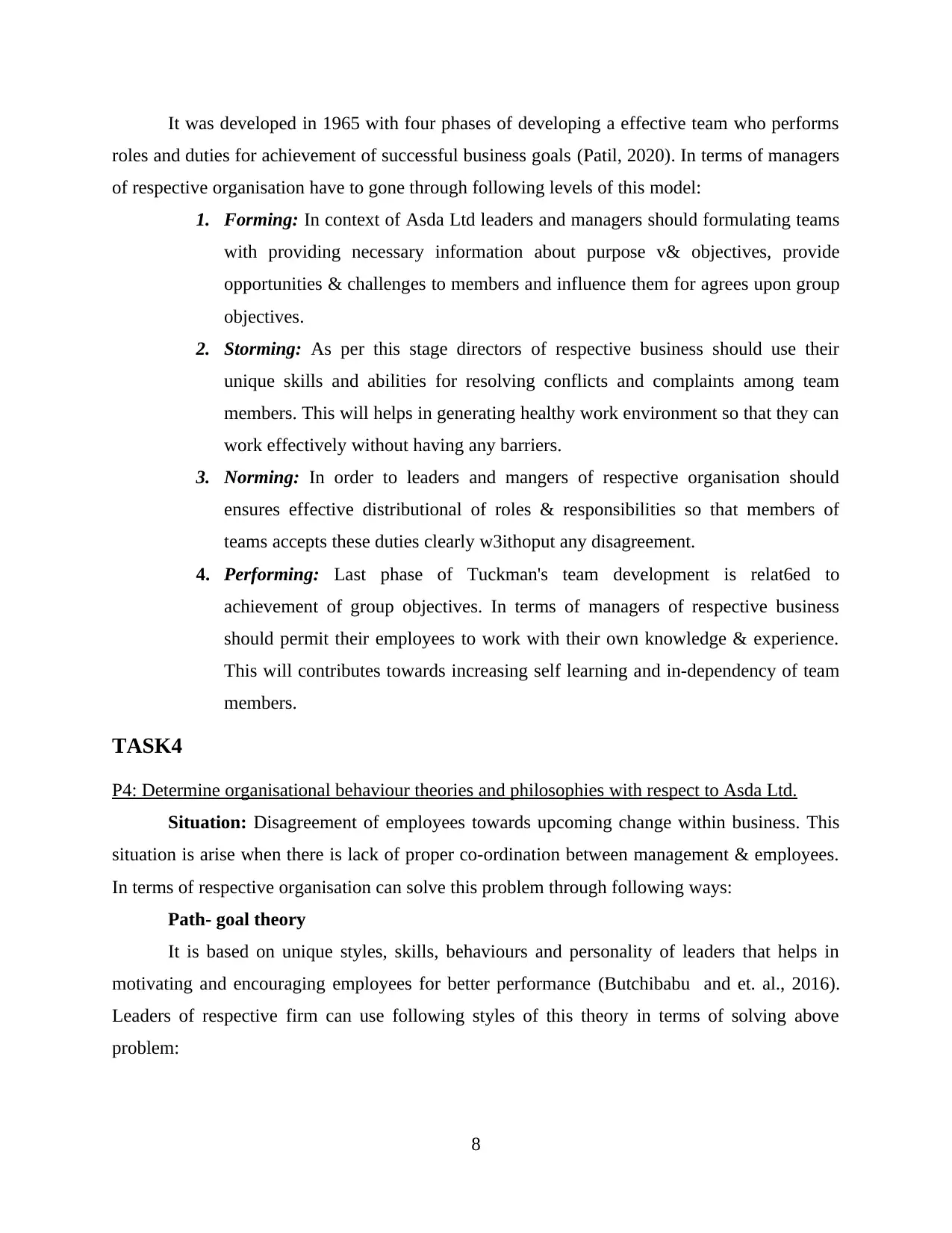
It was developed in 1965 with four phases of developing a effective team who performs
roles and duties for achievement of successful business goals (Patil, 2020). In terms of managers
of respective organisation have to gone through following levels of this model:
1. Forming: In context of Asda Ltd leaders and managers should formulating teams
with providing necessary information about purpose v& objectives, provide
opportunities & challenges to members and influence them for agrees upon group
objectives.
2. Storming: As per this stage directors of respective business should use their
unique skills and abilities for resolving conflicts and complaints among team
members. This will helps in generating healthy work environment so that they can
work effectively without having any barriers.
3. Norming: In order to leaders and mangers of respective organisation should
ensures effective distributional of roles & responsibilities so that members of
teams accepts these duties clearly w3ithoput any disagreement.
4. Performing: Last phase of Tuckman's team development is relat6ed to
achievement of group objectives. In terms of managers of respective business
should permit their employees to work with their own knowledge & experience.
This will contributes towards increasing self learning and in-dependency of team
members.
TASK4
P4: Determine organisational behaviour theories and philosophies with respect to Asda Ltd.
Situation: Disagreement of employees towards upcoming change within business. This
situation is arise when there is lack of proper co-ordination between management & employees.
In terms of respective organisation can solve this problem through following ways:
Path- goal theory
It is based on unique styles, skills, behaviours and personality of leaders that helps in
motivating and encouraging employees for better performance (Butchibabu and et. al., 2016).
Leaders of respective firm can use following styles of this theory in terms of solving above
problem:
8
roles and duties for achievement of successful business goals (Patil, 2020). In terms of managers
of respective organisation have to gone through following levels of this model:
1. Forming: In context of Asda Ltd leaders and managers should formulating teams
with providing necessary information about purpose v& objectives, provide
opportunities & challenges to members and influence them for agrees upon group
objectives.
2. Storming: As per this stage directors of respective business should use their
unique skills and abilities for resolving conflicts and complaints among team
members. This will helps in generating healthy work environment so that they can
work effectively without having any barriers.
3. Norming: In order to leaders and mangers of respective organisation should
ensures effective distributional of roles & responsibilities so that members of
teams accepts these duties clearly w3ithoput any disagreement.
4. Performing: Last phase of Tuckman's team development is relat6ed to
achievement of group objectives. In terms of managers of respective business
should permit their employees to work with their own knowledge & experience.
This will contributes towards increasing self learning and in-dependency of team
members.
TASK4
P4: Determine organisational behaviour theories and philosophies with respect to Asda Ltd.
Situation: Disagreement of employees towards upcoming change within business. This
situation is arise when there is lack of proper co-ordination between management & employees.
In terms of respective organisation can solve this problem through following ways:
Path- goal theory
It is based on unique styles, skills, behaviours and personality of leaders that helps in
motivating and encouraging employees for better performance (Butchibabu and et. al., 2016).
Leaders of respective firm can use following styles of this theory in terms of solving above
problem:
8
Paraphrase This Document
Need a fresh take? Get an instant paraphrase of this document with our AI Paraphraser
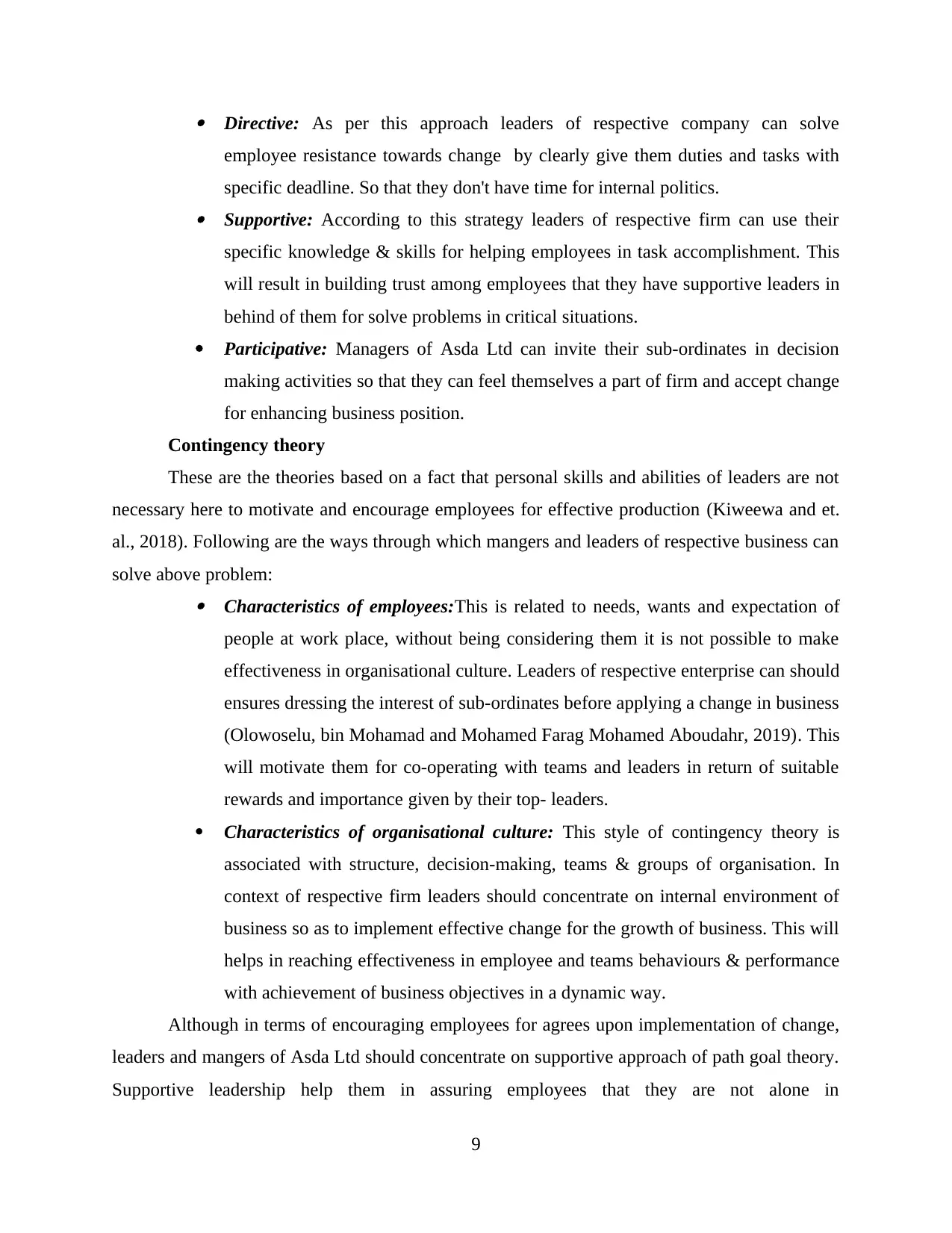
Directive: As per this approach leaders of respective company can solve
employee resistance towards change by clearly give them duties and tasks with
specific deadline. So that they don't have time for internal politics.
Supportive: According to this strategy leaders of respective firm can use their
specific knowledge & skills for helping employees in task accomplishment. This
will result in building trust among employees that they have supportive leaders in
behind of them for solve problems in critical situations.
Participative: Managers of Asda Ltd can invite their sub-ordinates in decision
making activities so that they can feel themselves a part of firm and accept change
for enhancing business position.
Contingency theory
These are the theories based on a fact that personal skills and abilities of leaders are not
necessary here to motivate and encourage employees for effective production (Kiweewa and et.
al., 2018). Following are the ways through which mangers and leaders of respective business can
solve above problem:
Characteristics of employees:This is related to needs, wants and expectation of
people at work place, without being considering them it is not possible to make
effectiveness in organisational culture. Leaders of respective enterprise can should
ensures dressing the interest of sub-ordinates before applying a change in business
(Olowoselu, bin Mohamad and Mohamed Farag Mohamed Aboudahr, 2019). This
will motivate them for co-operating with teams and leaders in return of suitable
rewards and importance given by their top- leaders.
Characteristics of organisational culture: This style of contingency theory is
associated with structure, decision-making, teams & groups of organisation. In
context of respective firm leaders should concentrate on internal environment of
business so as to implement effective change for the growth of business. This will
helps in reaching effectiveness in employee and teams behaviours & performance
with achievement of business objectives in a dynamic way.
Although in terms of encouraging employees for agrees upon implementation of change,
leaders and mangers of Asda Ltd should concentrate on supportive approach of path goal theory.
Supportive leadership help them in assuring employees that they are not alone in
9
employee resistance towards change by clearly give them duties and tasks with
specific deadline. So that they don't have time for internal politics.
Supportive: According to this strategy leaders of respective firm can use their
specific knowledge & skills for helping employees in task accomplishment. This
will result in building trust among employees that they have supportive leaders in
behind of them for solve problems in critical situations.
Participative: Managers of Asda Ltd can invite their sub-ordinates in decision
making activities so that they can feel themselves a part of firm and accept change
for enhancing business position.
Contingency theory
These are the theories based on a fact that personal skills and abilities of leaders are not
necessary here to motivate and encourage employees for effective production (Kiweewa and et.
al., 2018). Following are the ways through which mangers and leaders of respective business can
solve above problem:
Characteristics of employees:This is related to needs, wants and expectation of
people at work place, without being considering them it is not possible to make
effectiveness in organisational culture. Leaders of respective enterprise can should
ensures dressing the interest of sub-ordinates before applying a change in business
(Olowoselu, bin Mohamad and Mohamed Farag Mohamed Aboudahr, 2019). This
will motivate them for co-operating with teams and leaders in return of suitable
rewards and importance given by their top- leaders.
Characteristics of organisational culture: This style of contingency theory is
associated with structure, decision-making, teams & groups of organisation. In
context of respective firm leaders should concentrate on internal environment of
business so as to implement effective change for the growth of business. This will
helps in reaching effectiveness in employee and teams behaviours & performance
with achievement of business objectives in a dynamic way.
Although in terms of encouraging employees for agrees upon implementation of change,
leaders and mangers of Asda Ltd should concentrate on supportive approach of path goal theory.
Supportive leadership help them in assuring employees that they are not alone in
9
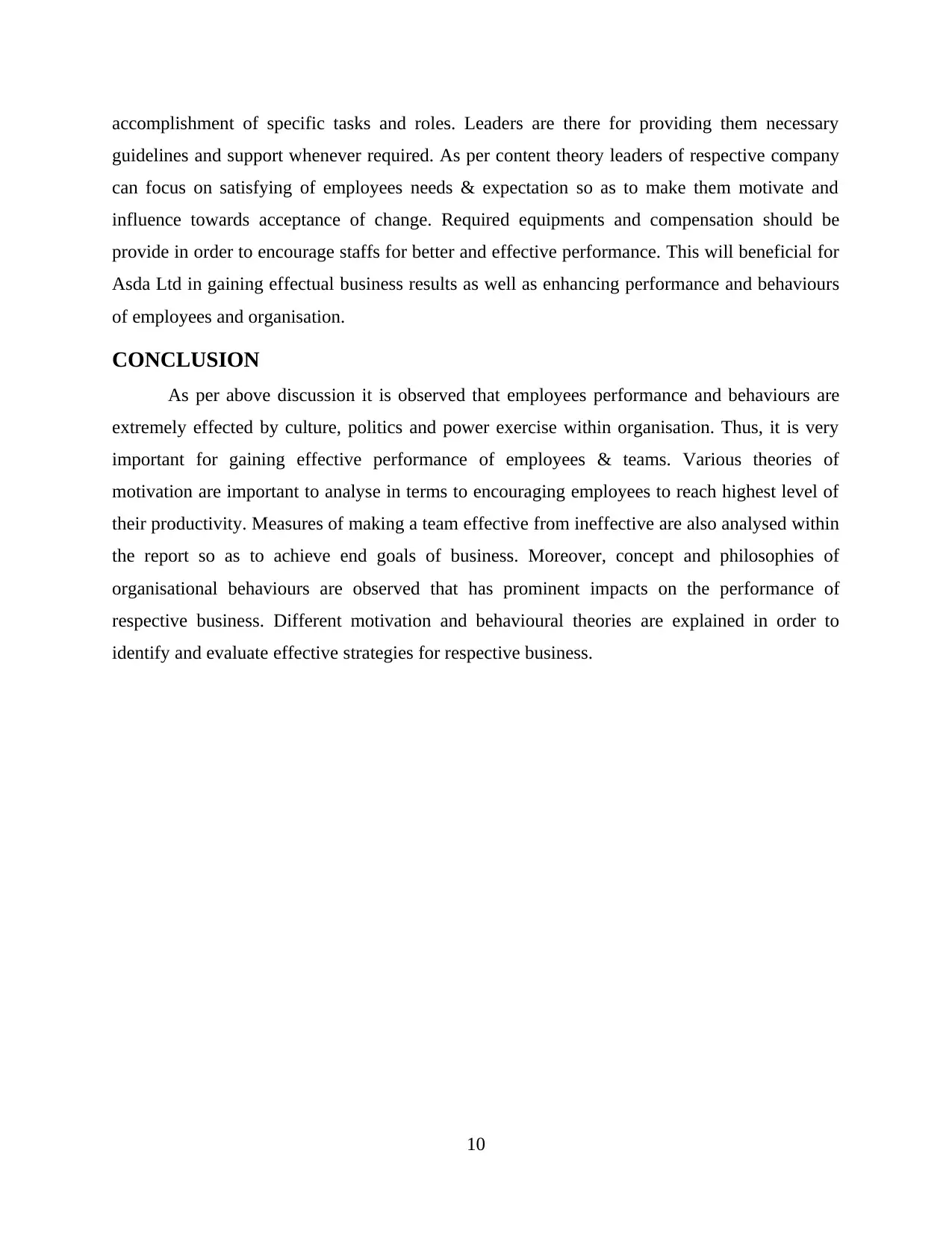
accomplishment of specific tasks and roles. Leaders are there for providing them necessary
guidelines and support whenever required. As per content theory leaders of respective company
can focus on satisfying of employees needs & expectation so as to make them motivate and
influence towards acceptance of change. Required equipments and compensation should be
provide in order to encourage staffs for better and effective performance. This will beneficial for
Asda Ltd in gaining effectual business results as well as enhancing performance and behaviours
of employees and organisation.
CONCLUSION
As per above discussion it is observed that employees performance and behaviours are
extremely effected by culture, politics and power exercise within organisation. Thus, it is very
important for gaining effective performance of employees & teams. Various theories of
motivation are important to analyse in terms to encouraging employees to reach highest level of
their productivity. Measures of making a team effective from ineffective are also analysed within
the report so as to achieve end goals of business. Moreover, concept and philosophies of
organisational behaviours are observed that has prominent impacts on the performance of
respective business. Different motivation and behavioural theories are explained in order to
identify and evaluate effective strategies for respective business.
10
guidelines and support whenever required. As per content theory leaders of respective company
can focus on satisfying of employees needs & expectation so as to make them motivate and
influence towards acceptance of change. Required equipments and compensation should be
provide in order to encourage staffs for better and effective performance. This will beneficial for
Asda Ltd in gaining effectual business results as well as enhancing performance and behaviours
of employees and organisation.
CONCLUSION
As per above discussion it is observed that employees performance and behaviours are
extremely effected by culture, politics and power exercise within organisation. Thus, it is very
important for gaining effective performance of employees & teams. Various theories of
motivation are important to analyse in terms to encouraging employees to reach highest level of
their productivity. Measures of making a team effective from ineffective are also analysed within
the report so as to achieve end goals of business. Moreover, concept and philosophies of
organisational behaviours are observed that has prominent impacts on the performance of
respective business. Different motivation and behavioural theories are explained in order to
identify and evaluate effective strategies for respective business.
10
⊘ This is a preview!⊘
Do you want full access?
Subscribe today to unlock all pages.

Trusted by 1+ million students worldwide
1 out of 13
Related Documents
Your All-in-One AI-Powered Toolkit for Academic Success.
+13062052269
info@desklib.com
Available 24*7 on WhatsApp / Email
![[object Object]](/_next/static/media/star-bottom.7253800d.svg)
Unlock your academic potential
Copyright © 2020–2026 A2Z Services. All Rights Reserved. Developed and managed by ZUCOL.





